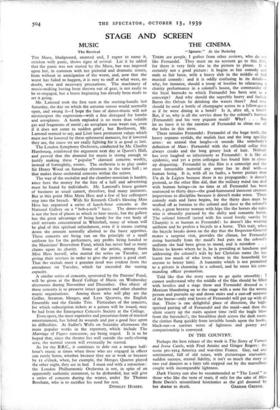THE CINEMA
" Ignace." At the Berkeley
THERE are people, I gather from other reviews, who do not like Femandel. They must on no account go to this film, for there is very little else in the picture to please. It is certainly not a good picture: it begins as fair comedy and ends as fair farce, with a heavy slab in the middle of bad musical comedy: and it is oddly confusing in its details— why, for instance, should a troop of lovelies be rehearsing a charity performance in a colonel's house, the commander of the local barracks to which Femandel has been sent as a conscript? And why should the superbly heavy and foolish Baron des Orfrais be drinking the waters there? And why should he send a bottle of champagne across to a fellow-guest as if he were dining in a hotel? Is it, after all, a hotel? But, if so, why is all the service done by the colonel's batman (Femandel) and his very piquant maid? Why? . . . But let us leave it to the enemies of Femandel to clean out all the holes in this sieve.
There remains Femandel : Femandel of the huge teeth, the heavy soprano eyelids, the mulish face and the long ape-like arms : an animal that laughs—it sounds like somebody's definition of Man: Femandel with the celluloid collar that always creaks and the long greasy lock of hair. Nobody has ever laughed so infectiously as Fernandel: it is like an epidemic, and yet a prim colleague has found him in close- up disgusting. Fernandel in this film is a conscript and the most intractable material any army has to deal with—a human being. It is, with all its faults, a better picture than Un de la Legion because there is no propaganda : it doesn't pretend, as the other film did, that the military mind can deal with human beings—in no time at all Fernandel has been sentenced to thirty days—the good-humoured innocent creature impervious to discipline because it doesn't make sense. There comedy ends and farce begins, for the thirty days must he worked off as batman to the colonel and slave to the colonel's wife, a great brawny woman with hips like the horses she rides who is absurdly pursued by the shifty and romantic baron. The colonel himself (acted with his usual lovely suavity by Charpin) is as human as Fernandel: he doesn't like wearing uniform and he prefers a bicycle to a horse. This trait, when the bicycle breaks down on the day that the Inspector-General makes a surprise visit, provides the climax, for Fernandel rising hurriedly from th? maid's bed puts on the colonel's uniform she had been given to mend, and is mistaken . . . Before he knows where he is, he is presiding at luncheon and addressing the colonel's wife by her Christian name (he has learnt too much of who loves whom in the household for anyone to betray him). A humanity which is not permitted to a private is charming in a colonel, and he earns his com- manding officer promotion.
Told like that the story seems to go quite smoothly: I cannot understand why the middle of the film should be filled with lovelies and a stage show and Femandel dressed as a Mexican blundering on to the stage with a note for the wrong person and pursuits up and down stairs and a cast-off mistress of the baron—only real lovers of Fernandel will put up with all that. There is one delightful piece of direction, the high- spirited pairing off of Fernandel and the maid—and then the silent scurry up the stairs against time (will the bugle blow from the barracks?), the breathless dash across the dark room. the clothes flung quickly from invisible hands upon the hooks. black-out—a curious sense of lightness and poetry and companionship is conveyed.
IN THE COUNTRY.
Perhaps the best release of the week is The Story of Vernon: and Irene Castle, with Fred Astaire and Ginger Rogers: th:. scene pre-1914 America and war-time France. Gay, sad and sentimental, full of old tunes, with picturesque starvation. sudden success, eternal fidelity, it isn't so much the story o= two real dancers as a fairy tale stepped out by the marvellous couple with incomparable lightness.
Dark Victory can also be recommended at " The Local " to those who like the taste of tears, if only for the sake of Miss Bette Davis's streamlined histrionics as the girl doomed by










































 Previous page
Previous page